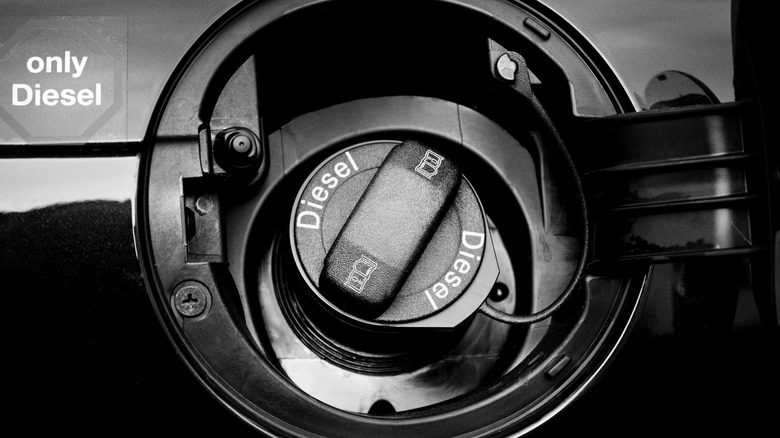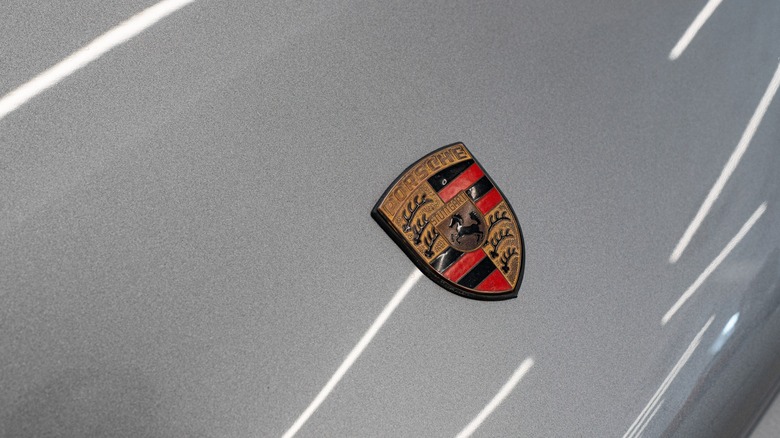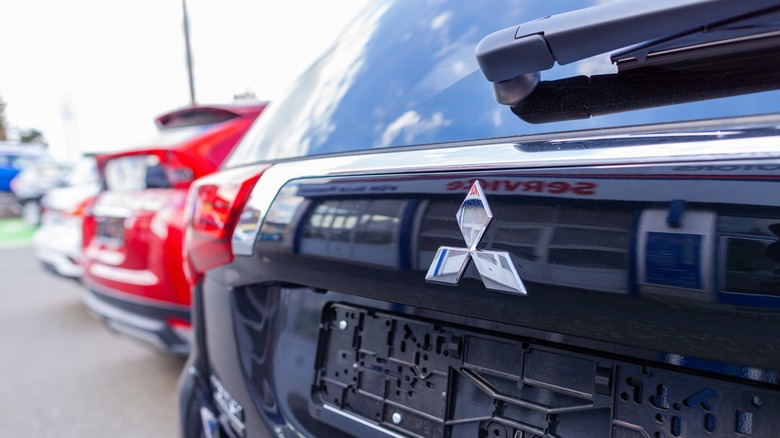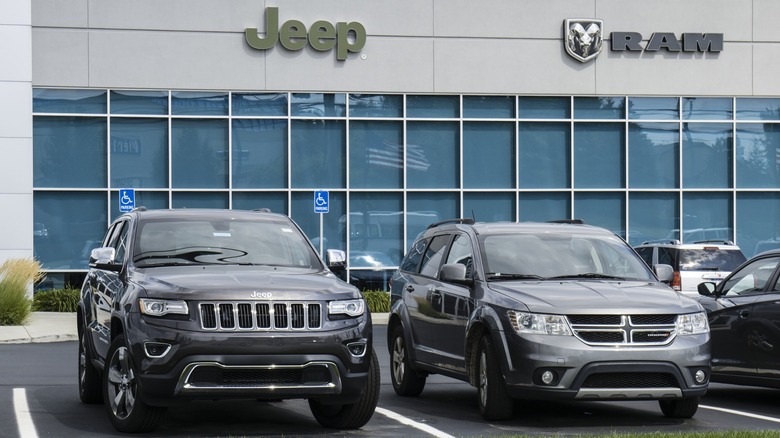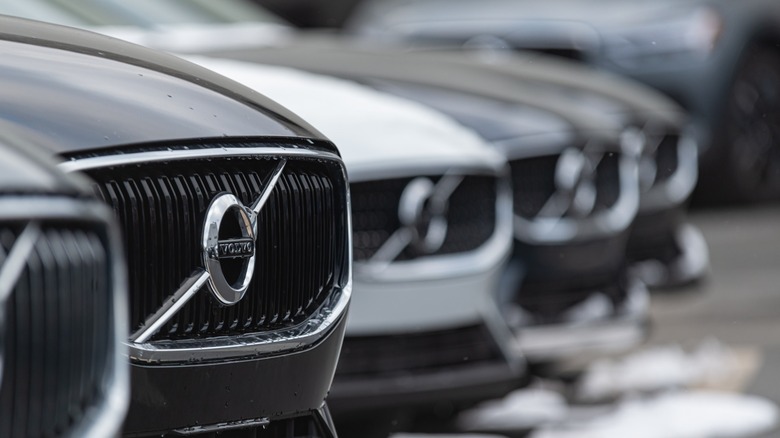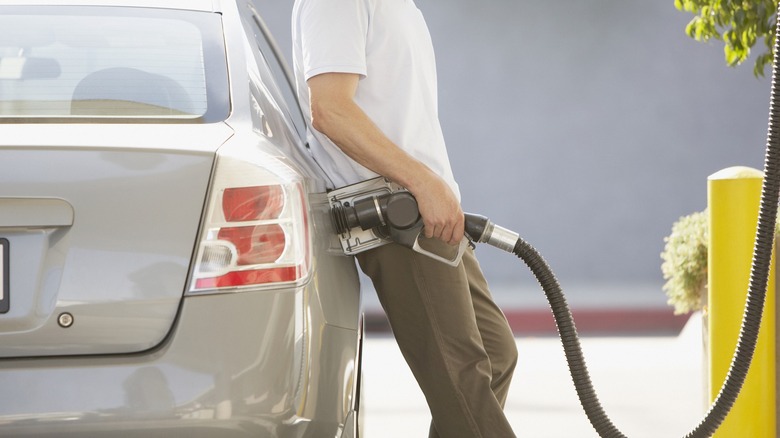4 Car Manufacturers That Have Stopped Offering Diesel Engines
It's no secret that car manufacturers are slowly inching closer to an inventory of predominantly electric vehicles. But with that new focus comes sacrifice, and for many brands, the diesel engine has become less and less of a priority.
While you're still likely to see diesel engines in commercial applications, consumer options are becoming less and less common. With global metropolises like Paris and Madrid planning to ban diesel as of 2025 and Californians mainly choosing electric vehicles over conventionally powered cars, there's a significantly diminished market for the noisy alternative to the standard gas-powered engine.
Manufacturers worldwide have taken a stand against diesel, not only for environmental concerns but because diesel engines cost more to build. You may find the occasional outlier, but these four car manufacturers have either completely halted the production of any diesel-powered vehicle or have committed to ending production in the near future.
Porsche
While some car manufacturers are inching their way toward a diesel-free future, Porsche has been there since 2018. In a public announcement, Porsche announced it would be completely eradicating its diesel line of cars, stating, "Porsche has always matched its product range to its customers' requirements and the pursuit of technological excellence." Its decision was in part due to declining demand for diesel vehicles, and the increasing interest in hybrid models.
Throughout 2017, diesel only made up 12% of the company's global sales. Reacting to the change in consumer focus, Porsche committed to investing over $6 billion in shifting its lineup to hybrid and electric models. Thankfully, the loss of diesel-powered cars didn't result in a round of layoffs, as Porsche stated the move to electric actually created over 1,500 jobs at its Zuffenhausen plant.
By 2019, the luxury car manufacturer had introduced its first fully electric sportscar – the Taycan. As of April 2024, Porsche added an additional e-performance model, the Macan Electric, and has two hybrid models, the Cayenne and Panamera. Among its current lineup, though, are absolutely no diesel engines.
Mitsubishi
From 2015 to 2018, the number of small diesel cars registered in Europe dropped from 825,591 to 468,856 — a 43% reduction. In response, companies like Mitsubishi decided to finally make the move away from diesel and instead put more emphasis on either their standard gas-powered vehicles or shift more toward electric.
In 2019, Nikkei Asian Review revealed that the Tokyo-based manufacturer was leaving diesel behind by December 2021. Though there wasn't an official timeline for a full phase-out of diesel vehicles, the report noted that the manufacturer was cutting down on its SUV and small truck diesel lineup in the United States and Europe. It also stated that upgrades would still be implemented on diesel models like the Outlander throughout 2021.
A quick search of Mitsubishi's new inventory shows that there are no new diesel models available for purchase. In fact, the Outlander, which was among the manufacturer's last diesel vehicles, is now available as a gas/electric plug-in hybrid model.
Jeep and RAM
Much to the chagrin of the biggest supporters of its utilitarian line of Jeep and RAM vehicles, Chrysler (or, more accurately, its parent company, Stellantis) opted to put an end to its EcoDiesel line. In a 2018 Financial Times report, Fiat Chrysler confirmed it was making a significant shift away from diesel cars, which meant big changes for Jeep and RAM.
Chrysler later confirmed in 2022 that the end of the EcoDiesel Wrangler and RAM 1500 EcoDiesel models was near, and both lines officially stopped production in 2023. As a sendoff to the EcoDiesel, Jeep did release the Wrangler Rubicon FarOut for 2023.
Powered by a diesel 3.0L engine, the FarOut edition was a limited-edition treat for long-time Wrangler drivers. It was complete with 17-inch aluminum wheels, a "Diesel 3.0L" graphic on the hood, black leather seats with red accents, and everything included in the Cold Weather Group, Heavy Duty Electrical Group, Trailer-Tow, LED lighting, and Safety Group packages.
While the Wrangler was leaving diesel behind, Jeep continued to offer the diesel version of the Jeep Gladiator. At least for the next year, it did. Like the Wrangler, the EcoDiesel Gladiator was given one last hurrah with its own Rubicon FarOut Edition before Jeep completely eradicated its diesel line. According to reports in 2023, Jeep stated it would be shifting focus to electric.
Unlike Jeep, RAM didn't offer a sendoff to its 1500 EcoDiesel.
Volvo
During Climate Week NYC in 2023, Volvo made the commitment to officially end its diesel car production. As part of the announcement, Volvo stated it would convert its entire line of consumer vehicles to electric by 2030, starting with a complete cessation of diesel-powered car production by early 2024.
Though Volvo made its plans public at Climate Week NYC, it had already been making moves behind the scenes to end production on its combustion vehicles. In November 2022, the manufacturer sold its stake in Aurobay. Just a year prior, Volvo entered into a partnership with Geely Holding to develop the subsidiary, which was intended to oversee powertrain development while allowing Volvo to, "focus fully on the development of its new range of all-electric premium cars."
According to Volvo, the sudden shift in focus is a reaction to concerns over climate change. "We're all-in on electrification because it's the right thing to do," Volvo stated in a September 2023 release. "The recent Global Climate Stocktake report issued by the United Nations underlined the urgency of the climate emergency faced by humanity, as well as the need for action."
The last Volvo diesel-powered car to roll off the production line was an XC90 destined for a display case at the World of Volvo in Gothenburg.
What does this mean for the future of gas-powered vehicles?
Just because car manufacturers have decided to cease production of diesel engines doesn't mean we're shifting entirely into an all-electric climate, right? Well, not immediately, at least. Companies like General Motors plan to end the production of all gas-powered vehicles by 2035. Other manufacturers, like Ford and Mercedes, pledged to join GM in an effort to phase out gas and diesel-powered engines worldwide by 2040.
While it didn't make a stand alongside Ford, Mercedes, Volvo, and GM, Toyota has had its own timeline for a lower-emissions inventory. In a 2017 press conference at the Tokyo Motor Show, Toyota's chief Safety Technology Officer, Kiyotaka Ise, confirmed that, while Toyota is dedicated to shifting away from gas engines, it hasn't committed to an all-electric line. Rather, the company will focus on hybrid and hydrogen fuel cell-powered vehicles for its 2050 goal of reducing CO2 emissions by 90%.
Though the manufacturer hasn't made an official statement, it's believed Nissan plans on moving away from gas-powered cars, though not entirely. A report from Nikkei Asia states that Nissan Motor will cut its current development of 10 internal combustion engines to four, paving the way for a primarily electric inventory.
The widespread move to electric vehicles will allow manufacturers to adhere to statewide bans on the sale of new gas-powered vehicles rolling out across the United States. By 2035, California, Connecticut, Maryland, Massachusetts, New Jersey, New York, Oregon, Rhode Island, and Washington will start enforcing the ban.
